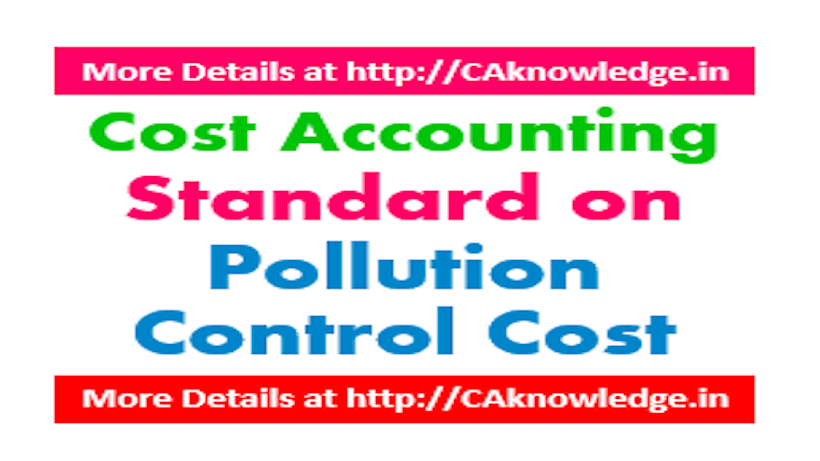Analysis of Cost Accounting Standard on Pollution Control Cost, CAS on pollution control cost, This standard deals with the principles and the methods of determining the Pollution control costs. Here we are providing Objectives of Cost Accounting Standard, Scope of Cost Accounting Standard, Principles of Measurement etc. Now you can scroll down below and check more details regarding “Analysis of Cost Accounting Standard on Pollution Control Cost”
Objective
The objective of this standard is to bring uniformity and consistency in the principles and methods of determining the Pollution Control Costs along with reasonable accuracy.
Scope
This standard should to be applied to cost statements which require classification, measurement, assignment, presentation and disclosure of Pollution Control Costs.
Let us have a look on the Principles of Measurement:
Pollution Control costs shall be the aggregate of direct and indirect cost relating to Pollution Control activity.
Direct cost
Advertisement
Direct cost to include the cost of materials, consumable stores, spares, manpower, equipment usage, utilities, resources for testing & certification and other identifiable resources consumed in activities such as waste processing, disposal, remediation and others.
Indirect cost
Indirect cost includes the cost of resources common to various Pollution Control activities.
Costs of Pollution Control which are internal to the entity should be accounted for when incurred. They should be measured at the historical cost of resources consumed.
The cost shall be estimated and accounted based on the quantum of pollution generated in each period and the associated cost of remediation or disposal in future.
Contingent future remediation or disposal costs e.g. those likely to arise on account of future legislative changes on pollution control shall not be treated as cost until the incidence of such costs become reasonably certain and can be accurately measured.
External costs
External costs of pollution which are generally the costs imposed on external parties including social costs are difficult to estimate with reasonable accuracy and are excluded from general-purpose cost statements.
Cost of in-house Pollution Control activity shall include cost of materials, consumables, stores, spares, manpower, equipment usage, utilities, and other resources.
Cost of Pollution Control activity carried out by outside contractors inside the entity shall include charges payable to the contractor and cost of materials, consumable stores, spares, manpower, equipment usage, utilities, and other necessary costs incurred by the entity for such jobs.
Cost of Pollution Control jobs carried out by contractor at its premises shall be determined at invoice or agreed price including duties and taxes, and other expenditure directly attributable thereto net of discounts (other than cash discount), taxes and duties refundable or to be credited. This cost shall also include the cost of other resources provided to the contractors.
Principles
Pollution Control costs shall be traced to a cost object to the extent economically feasible. Where the Pollution Control cost is not directly traceable to cost object, it shall be treated as overhead and assigned based on either of the following two principles;
- i) Cause and Effect – Cause is the process or operation or activity and effect is the incurrence of that cost.
- ii) Benefits received – overheads are to be apportioned to the various cost objects in the proportion of the benefits received through them.
Where estimates are made of future costs to be incurred on pollution control, the basis of that estimate shall be disclosed separately.
Disclosures shall be made in the body of the Cost Statement or as a foot note or as a separate schedule.
